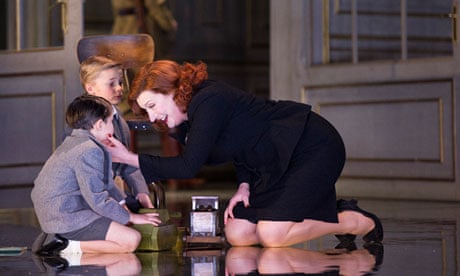David McVicar's new production of Marc-Antoine Charpentier marks English National Opera's second foray into French Baroque opera. Unlike its predecessor – Barrie Kosky's abstruse 2011 staging of Rameau's Castor and Pollux – it's a great achievement that vindicates the company's determination to bring important yet unfamiliar repertory to UK audiences.
Its theatrical success lies in McVicar's ability to find a metaphor that embraces both the classical narrative and the mix of song, dance and declamatory recitative which are integral to the form. Updating the opera to the close of the second world war, he sets it in a baroque palace used as a war room and meeting place for allied officers. It's a world in which political rectitude masks a failure to confront the inner demons that Sarah Connolly's self-lacerating Medea is driven to unleash.
The dances, formidably choreographed by Lynne Page, mirror the work's emotional trajectory. Its opening masques and victory parades have overtones of 1930s Hollywood musicals. But when Medea is pushed beyond breaking point by Jeffrey Francis's duplicitous Jason, she summons the powers of darkness: flayed bodies erupt through the floor and Creon (Brindley Sherratt) is driven mad by multiple doppelgangers of his daughter Creusa (Katherine Manley), with whom he is incestuously fixated.
It's exceptional musically, too. Connolly, at the peak of her powers, has done nothing finer: she takes us with her every step of the way on a terrifying emotional journey. Francis superbly captures Jason's self-deception. Charpentier departs from classical tragedy in giving Jason a rival for Creusa's attentions in the form of Orontes, outstandingly played by Roderick Williams. None of it would work half as well, though, without Christian Curnyn, whose exquisite conducting is near-perfect. Unmissable.

Comments (…)
Sign in or create your Guardian account to join the discussion